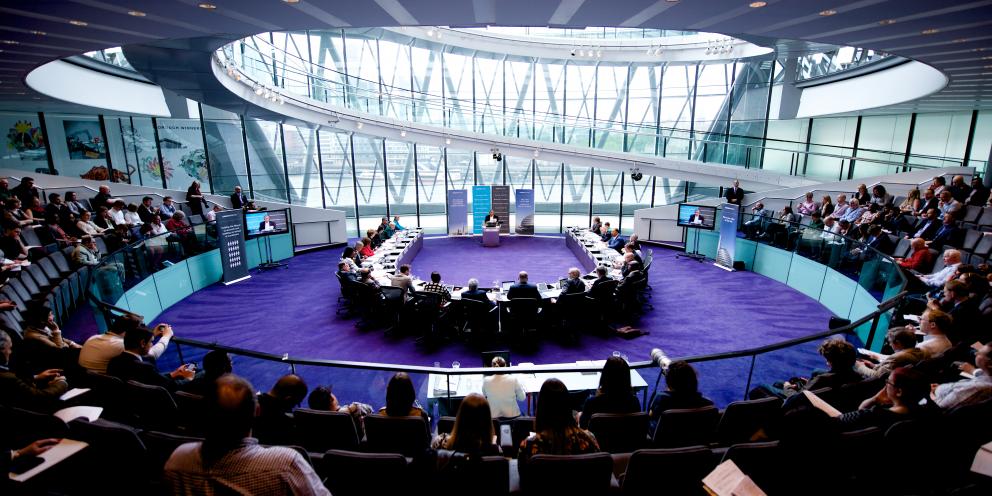When the GLA was originally conceived in the late 1990s its agenda involved a plethora of strategies with apparently independent focuses – economic, transport, environmental, spatial etc. Ken Livingstone as first Mayor sought to rationalise this by relabeling the spatial strategy as A London Plan, which would embody an integration of all of the other strategic work with geographic aspects. As a prelude to that, and to highlight its thrusts, he presented for public consultation Towards the London Plan in 2001 offering a rationale for a new direction for the city’s future, strongly oriented to growth (rather than managed contraction) and the target of delivering an exemplary, sustainable global city. There was (as I recall) quite publicised debate about this in a number of fora – though in truth alternatives were not offered, and only “constructive suggestions” seem to have been welcomed. And at the end of the planning cycle the Assembly’s Planning and Spatial Development Committee produced a thorough report on lessons learned in relation to London in its Regional Setting.
20 plus years down the line, with 5 completed rounds of London Plan making/reviews the situation seems a lot different. The London Plan dominates the scene – and the Economic Development Strategy, in particular, seems to have quite faded away, following the demise of the London Development Agency. But the Plan is essentially a spatial strategy, in the sense of being very heavily oriented to the concerns, and increasingly bureaucratised requirements, of “Town Planning”, as represented in successive versions of the National Planning Policy Framework (NPPF). The Plan document itself is extremely bulky and the process of “examining” it publicly in front of a panel of planning inspectors is a lengthy and costly one. In the main the process is one of tedium, relieved periodically as some genuinely contentious and analytically problematic issues come to the fore. But years down the line from their embedding in the Plan – and in a forum far removed from press attention, leave alone public engagement. And without post EiP reviews, engagement with the London planning process has become even more discontinuous.
Against this background, the idea (to be discussed at the Roundtable on 27th March) of publishing a re-Plan Strategic Options Review has three main objectives, all intended to help remedy what we take to be fundamental weaknesses now evident in the London Plan-making and review process:
- the lack of a strategic review of how economic, social and physical development processes operate and interact across the city (and its surrounding region), with what consequences (in a changing world) for London businesses, residents of different kinds and for the impacts of planning/other policies. To serve as a basis for both Plan making and review;
- the lack of any wide engagement with the processes of plan-making, debate, monitoring and evaluation beyond the core GLA team – involving the Assembly and other London political representatives, business and community groups, the city’s large pool of experts in these fields, and the media (whose interest has rarely been aroused when it could have helped) ; and
- a lack of particular attention to and openness about (what will turn out to be) critical issues of policy/targets and sources of uncertainty at formative stages in the planning process, when they could constructively be dealt with, rather than at the end when that is harder to manage both technically and politically.
Each of these resonates with two broader concerns highlighted during this series of seminar/ roundtable events, namely:
- a need to move beyond technically or bureaucratically defined measures, objectives and policy instruments, by relating these to coherent (intelligible and testable) understandings of the functional processes through which they interact – and the sources of change in these; and
- the need to embed the acts of plan-making, monitoring and review in a more continuous series of activities, keeping track of what is going on, what is changing, and what needs further attention/reinforcement. Over cycles extending well beyond Mayoral terms – and with an acceptance of the need for continuous learning.
The hope is that the roundtable can go some way toward identifying the kind of intermediate Strategic Review which is: feasible across the Mayoral strategy fields; constructive in relation to development of the formal Regional (spatial) Plan; and accessible enough to stimulate the debate across London communities – necessary to underpin claims to legitimacy in (inevitable) conflicts with central government, as well as to making of more beneficial outcomes. And start a wider debate about this.






In the. absence of a CHAT facility during your most excellent round table, I’m moved to add a link to a glimmer of optimism in the preparation of the 2016-21 London Plan. GLC LP team quite admirably consulted Just Space on the draft scoping study for the IIA. There were a number of constructive meetings and it looked as though the GLA would include a community-generated alternative in their (required) evaluation of alternatives. The process failed because our alternative was deemed not to be a stratgic spatial alternative. But it was a glimmer of what we should be pressing for. The story is fully told at https://justspace.org.uk/next-london-plan/community-alternative/ from 2017.
At your Roundtable you held a month earlier, one of the delegates stated that The GLA’s planning activities are politically bounded, by the Mayor. I would imagine also in all likelihood at the next level Central Government.
Discussions about building more housing on strategically selected tiny sections of the Green Belt or on municipal golf courses are excluded due in built fears of voter Nimbyism and citizens confusion with unconstrained ribbon development and property value erosion.
Your comments that The London Plan has become an adjunct to the NPPF and the statutory planning processes is correct. Yet the London Plan in fulfilling its role is vital as insufficient numbers of London’s Borough’s have local plans that are sufficiently up to date to align with even the last GLA Plan. At a statutory level, the framework and complex policy structure of the GLA’s Plan is providing a stop gap for the borough’s without recent local plans.
We do need metropolitan region higher level social and economic spatial plans that debate and state the broader and very vital questions you raise in your blog.
Much of the data needed to analyse and scenario construct is available from disparate sources. If the GLA is too politically controlled, then possibly could it be that institutions such as LSE London and The Bartlett should take the initiative to produce the types of analyses that you correctly advocate is missing?
Could some of London’s other non-aligned planning consultancies co-contribute, or might they fear preclusion from future assignments from the GLA and the DLHC?